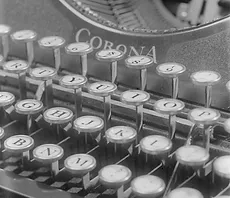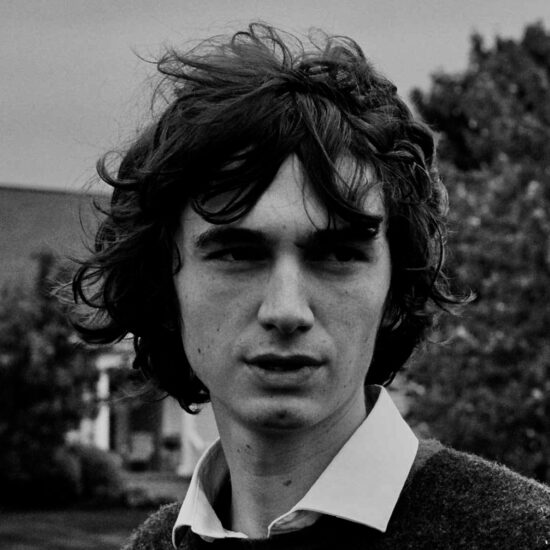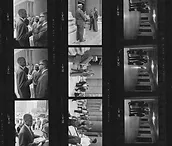Photo by Afro American Newspapers/Gado/Getty Images
Invited by famed Soviet filmmaker Sergei Eisenstein, Paul Robeson first visited the Soviet Union in 1934. After many conversations with the great director, Robeson was invited to play a leader in the Haitian Revolution for a film that would never be made. (It was one of many ambitious pictures starring Black Americans that never materialized in the Soviet Union; another was written by Langston Hughes.)
Robeson’s response to his visit is well known: “It was the first time I felt like a human being.”
Eisenstein introduced Robeson at a Moscow reception in January 1935 with a proclamation, “This is Paul Robeson, the greatest American singer!”
The photograph here from that meeting (with Robeson at center and Eisenstein at right) provides a marker of cultural intersection between the passionate civil rights advocate and the socialist filmmaker, one that would blossom in the coming decades.
In the Soviet capital, he sang labor songs and “Negro spirituals” before finishing with two Russian songs from the opera “Boris Godunov,” one old folk song and a Cossack lullaby. His wife Eslanda credits that trip for Robeson’s renewed interest in film.
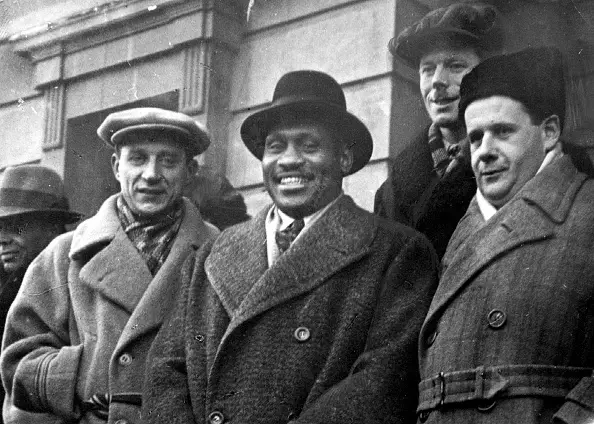
Photo by Afro American Newspapers/Gado/Getty Images
A multilingual student of the world, Robeson spent the two preceding years learning Russian, studying the culture, and reading the Communist Party’s newspaper, Pravda. Crowds cheered Robeson during each of his visits, and they filled stadiums to hear him sing. On one occasion in August 1958 (captured below), a vast crowd greeted him as he disembarked from a plane.
During that trip, a crowd of 120,000, half of whom had to stand outside, turned out at the Sports Palace. There, Eslanda Robeson met First Secretary of the Communist Party of the Soviet Union, Nikita Krushchev and his wife, Nina Petrovna Khrushcheva. “Everywhere we had marvelous audiences,” she recalled. Those audiences, the descendants of freed illiterate serfs who were now university-educated industrial workers, felt a warm solidarity with Robeson, the son of a freed enslaved father.
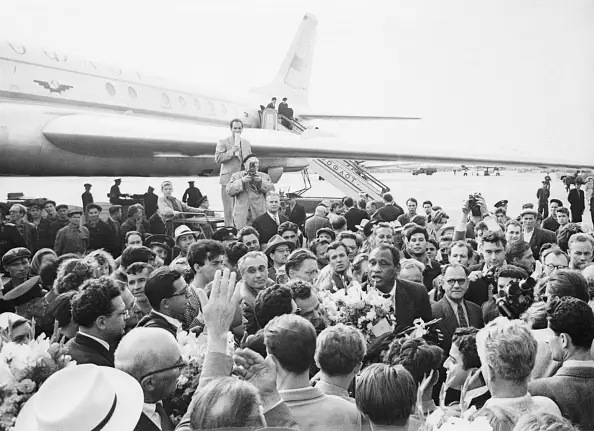
Photo by Bettmann Collection/Getty Images
While Robeson was blacklisted in the United States, he remained a celebrity in the USSR. In 1949, members of a sports club in Kazakstan discovered a new peak in the Ile Ala-Tau mountains close to China. They named it after the “prominent Negro singer and progressive public leader, Paul Robeson.”
Vern Smith, the Moscow correspondent for the U.S. Communist Party’s newspaper, the Daily Worker, asked if Robeson had “noticed a race question in the Soviet Union.” Bursting out with a low laugh, he responded, “Only that it seems to work to my advantage!”
In another interview, Robeson expressed an intent to move to the USSR and, though he never did, he did enroll his son Paul Robeson Jr. in a Moscow school in the late 1930s. A young Jr. can be seen visiting a sculpture studio of the House of Pioneers in the photo below (with a sculpture of Stalin on the left and of Alexander Pushkin in the background).
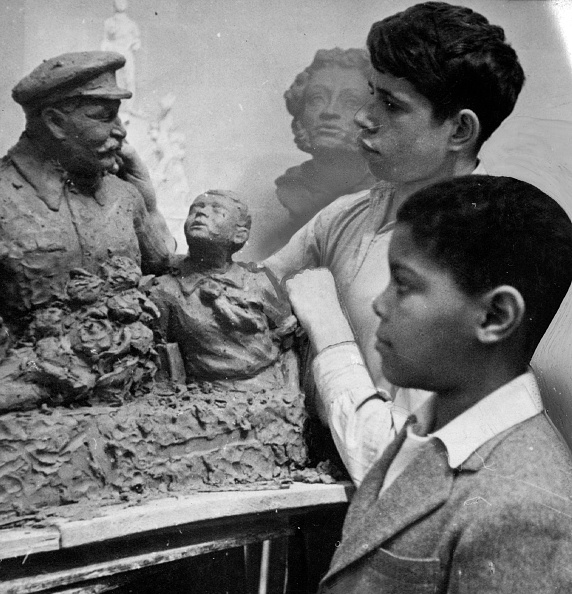
Photo by Afro American Newspapers/Gado/Getty Images
Edwin P. Hoyt, James Baldwin, and others accused the famed singer of being used as a pawn by the Soviets. He was condemned as a “Black Stalin” in the press and faced threats of violence from the KKK among others. Biographer Gerald Horne wrote that critics saw his politics as being “not only improper and immoral, but, perhaps, a sign of mental derangment.”
But these accusations stripped the individual artist of his agency, assuming that the Columbia Law School graduate and multilingual stage actor who spent his free time studying philology couldn’t think for himself or understand that the USSR wasn’t perfect.
Robeson Jr. rejected Baldwin and Hoyt’s characterizations of his father, refuting implicitly racialized insults of “his lack of understanding.”
While his support for Communist countries was considered controversial, so too was his advocacy for racial equality and labor rights in the United States. When questioned before the House Un-American Activities Committee in 1956, a congressman asked him why he didn’t just move to Russia.
Robeson responded, “Because my father was a slave and my people died to build this country, and I’m going to stay right here and have a part of it, just like you. And no fascist-minded people will drive me from it.”

Learn More:
Gerald Horne, Paul Robeson: The Artist as Revolutionary. (London, Pluto Press, 2016.)
Robeson, Paul, and Philip Sheldon Foner. Paul Robeson Speaks. (New York, Citadel Press, 1978.)
Paul Robeson, Here I Stand (Boston, Beacon Press, 1998).
Paul Robeson: The Great Forerunner, ed. Freedomways, Centennial edition (New York, International Publishers, 1998).


